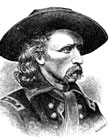Back to Collection Connections
[Detail] The Night Before Christmas by Clement C. Moore.
The Nineteenth Century in Print offers a variety of primary sources with which to practice language arts skills. Autobiographies by Frederick Douglass and General George A. Custer provide the opportunity to study personal narratives. Nineteenth-century biographies of women can be examined to understand the choices that authors make and how literature can contribute to social and political causes such as the equal rights movement. Civil War poetry and territorial guides are also available and can be used to study the use of tone, imagery, and persuasive writing techniques. Finally, the historical events represented in this collection can provide the basis for creative writing activities.
Autobiography: Frederick Douglass
Personal narratives of American historical figures such as Frederick Douglass and General George A. Custer provide insight into narrative techniques and the power of autobiography. Later expanded as The Life and Times of Frederick Douglass (1881), My Bondage and My Freedom (1857), is an affecting personal narrative in which the author presents a world that would seem strange and foreign to many of his readers:
Like other slaves, I cannot tell how old I am. This destitution was among my earliest troubles. I learned when I grew up, that my master . . . allowed no questions to be put to him, by which a slave might learn his age. Such questions are deemed evidence of impatience, and even of impudent curiosity. From certain events, however, the dates of which I have since learned, I suppose myself to have been born about the year 1817.
- How would you describe Douglass’s tone in My Bondage and My Freedom?
- What are the relationships between the narrator, other slaves, and the master?
- How does Douglass establish these relationships in his narrative?
- How would the effect of the passage above differ if it were written from a third-person perspective?
In the introduction to Douglass’s autobiography, Dr. James M’Cune Smith celebrates the book as “a noble vindication of the highest aims of the American anti-slavery movement. The real object of that movement is . . . to bestow upon the negro the exercise of all those rights, from the possession of which he has been so long debarred,” (page xvii).
- In what ways does Douglass's narrative contribute to what Smith called the “vindication” of the abolitionist movement?
- How does Douglass’s authorship of his life story and his use of a personal tone contribute to this effect?


